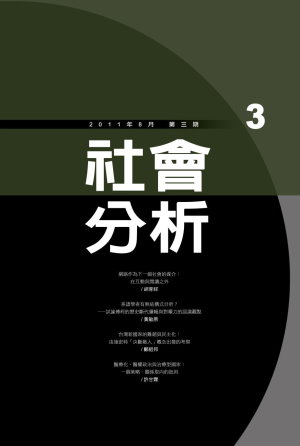Hot News

- 出版單位:東吳大學社會系;輔仁大學社會系;世新大學社會心理學系
| 中文篇名 |
台灣新國家的難題與民主化:由施密特「決斷敵人」概念出發的考察 | |
|---|---|---|
| 英文篇名 |
The Problem of New National State and Democratization in Taiwan: The Exploration Starting from Carl Schmitt's Concept of "Deciding Enemy" | |
| 作者 | ||
| 中文摘要 |
在本文中,研究者嘗試從兩岸的敵對性關係中,來對1990年代之後台灣新國家的難題(國族認同與政治統一性)與民主發展過程進行探討。首先,研究者從施密特的理論,來對「決斷敵人」的概念進行說明。其中最關鍵的命題就是決斷敵人對於形成政治統一性的重要意義。其次,研究者藉由Perry Anderson(2004/2004)、Benedict Anderson(2004)和Mann(2005)等3人的討論中,來強調「外部因素」(如:國際霸權)對認識台灣國族困境的特殊意義。透過上述兩點的討論,研究者試圖進一步提出兩點理論與經驗上的反省。一方面,「決斷」意味著一個政治共同體自主性的建立,而「民主」正是當前台灣面對外部現實主義困境時,一種重要的自主價值建立的方式。另一方面,1990年代之後中國逐漸成為影響台灣民主化發展的一個重要因素。研究者希望能透過相關的論述及分析來指出,在與中國的敵對關係中,中國因素如何形成台灣民主更進一步反省與深化的動力。 | |
| 英文摘要 |
In this essay, I attempt to explore from the angle of hostile relations across the Taiwan Strait the problem of new national state (e.g. national identity or political unity) and democratic development in Taiwan after 1990s. Firstly, we explain the concept of ‘deciding enemy' on the basis of Carl Schmitt's theory. The key proposition is the significance of deciding enemy for political unity. Secondly, from Perry Anderson (2004/2004), Benedict Anderson (2004) and Mann's (2005) point of view, it is important to understand the specificity of the national predicament in Taiwan from outer factors (for example, international hegemony). With those discussions, I want to propose two theoretical and empirical reflections. On the one hand, "deciding" means the establishment of the autonomy of political community. From this perspective, I want to reflect the point of realism and argue that the establishment of "democracy" is an important subjective value for Taiwan. On the other hand, "the China factor" gradually affects the democratic development in Taiwan after 1990s. With discursive analysis, we want to point out that the enmity across the Taiwan Strait provides the dynamic deepening the democratic development in Taiwan. | |
| 關鍵詞 |
民主、決斷敵人、政治統一性、新國家、democracy、deciding enemy、political unity、new national state | |
| 刊名 | ||
| 期數 | ||
| 起訖頁 |
83-117 | |
| 出版單位 |
東吳大學社會系;輔仁大學社會系;世新大學社會心理學系 | |
| 上一篇 | ||
| 下一篇 |


